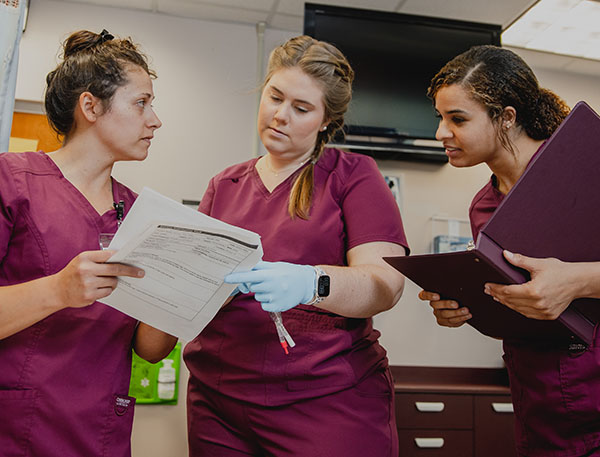Bridge – LPN to RN Transition
Licensed Practical Nurses (LPN) who have met program requirements may enter the nursing program and receive credit for prior learning.
The LPN will receive credit for the follow NSG courses:
- NSG 100
- NSG 130
- NSG 106
- NSG 152
- NSG 170
Students will receive 90 clinical hours for Credit for Prior Learning.
Mandatory Criteria:
| Category | Metric |
| High School Diploma or Equivalent | |
| High School Chemistry* | "C" Grade or Better |
| High School Biology* | "C" Grade or Better |
| Cumulative GPA | ≥ 2.5 |
| Completion of Prerequisite Semester Requirement: BIO 141 | "C" Grade or Better |
| Completion of Prerequisite Semester Requirement: BIO 142 | "C" Grade or Better |
| Completion of Prerequisite Semester Requirement: ENG 111 | "C" Grade or Better |
| Completion of Prerequisite Semester Requirement: PSY 230 | "C" Grade or Better |
| Completion of Prerequisite Semester Requirement: SDV 100 | "C" Grade or Better |
| Completion of Prerequisite Semester Requirement: PHI 220 | "C" Grade or Better |
| Completion of Prerequisite Semester Requirement: BIO 150 | "C" Grade or Better |
| Overall ATI TEAS Score (Composite Score) | ≥ 64% or Higher |
| Science ATI TEAS Score | ≥ 45% or Higher |
*If the applicant does not meet the high school prerequisites, they may gain proficiency through the college’s developmental courses. The high school requirements may be waived if BIO 141 and BIO 142 (Anatomy and Physiology I and II) are completed with a grade of “C” or better;

Students must submit:
- An application to Wytheville Community College and Selective Admissions to Health Professions Packet.
- A copy of high school diploma or equivalent.
- Official transcripts from previously attended high school and colleges; including practical nursing program.
- Submission of a copy of current unencumbered valid LPN license. Students who have probationary status, a suspended or revoked LPN licenses are not eligible to enter the nursing program.
- Evidence of TEAS VII Score
- Evidence of high school algebra, biology/ lab, chemistry: If a student has successfully completed BIO 141 and BIO 142, the high school chemistry requirement is waived.
- Successful completion of pre-requisite courses: SDV 101, ENG 111, BIO 141, PSY 230, PHI 220, BIO 142, BIO 150 (these courses must be complete with a grade of "C" or above and a cumulative GPA of 2.5
- Service region students (Bland, Carroll, Wythe, Grayson, Smyth (East of Marion) counties, and the city of Galax) are considered before out-of- region and out-of-state students.
If more students who meet the above admission requirements apply for admission than there are positions available, the admission policy rubric will be followed to rank students.
